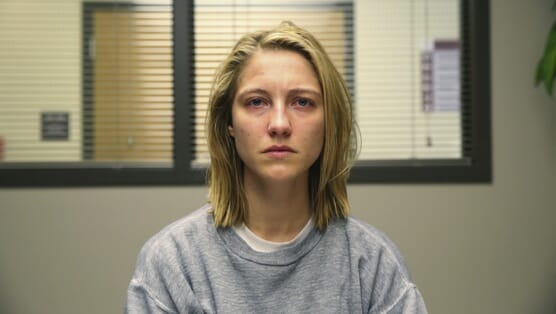American Crime: “Episode Nine”
(Episode 1.09)

Two confessions end “Episode Nine” of American Crime. One addresses the title: the murder, and murderer, of Matt Skokie. The second affirms a life. The latter closes the show. Taken together, they announce American Crime’s denouement. There’s plot left to work out, and details of the case. But the show with crime in its title was of course never about a single transgression. The trials, here, have been interior, that of a racist mom, a self-loathing immigrant, a deadbeat father, a repressed Christian, a drug addict, and the drug addict’s foolhardy love. Verdicts are nearing.
The confession to killing a man and shooting a woman swings like the showstopper, but, literally, it isn’t. In detail, for her lawyer, the DA, her foster mother, and us, the killer outs herself. Director Jessica Yu pushes the camera in for the account, for the detective running out of the room to find a recorder while Aubry fires her attorney and puts out of its misery her relationship with her foster dad. For the disbelief and clarification, Yu pulls the camera out. The scene is like a physical exhale. Her foster mother cries.
But we don’t share the room’s surprise. Carter, her boyfriend and the presumed guilty, may not be as docile as Aubry makes him out to be. There’s a pistol-whipped drug dealer out there who’d have something to say. Save for that one assault, though, her characterization mostly holds up. He’s cool. He can endure, for her. The foster mother pegs him better, as an enabler with the aspirations of a savior. Aubry, on the other hand, is walking self-destruction. She’s cut a man’s throat, without regard for her lethality. She convinced Carter, while out on bond pending a murder trial, to take off. Perhaps she’s not worst case scenario-addict, because the treachery of addiction can be as fantastic as it can be fatal, but if not, god help her. She’s almost singlehandedly distorted the show’s sense of truth—the factual sort. She’s manipulated everyone with whom she’s interacted, including Carter, and by extension, us. Trust, honesty, and loyalty have been pushed past disrepute to a point of irrelevance. Did she kill Matt? Was she raped by her foster brother and his friends? There exist answers. Can we possibly know them?
The authorities don’t. Aubry gives them narrative coherence, which is legally invaluable. This, she says, is the truth: Carter gets drugs from Matt Skokie but comes up short on money; Matt concedes sex with Aubry as acceptable tender; Carter declines and robs him; Barb’s racism apparently had sunk into Matt and grown; Aubry returns later, with a gun (not Carter’s) for self-defense, to settle; Matt sexually assaults Aubry and winds up shot dead in the face, his wife taking a bullet as well. Aubry packages the story with a kicker, too, noting the river into which she tossed the gun, a detail she’d know only as a cop or as the person who disposed of the firearm. This passes logical perimeters the story slung onto Carter never could. Neither the detective nor the DA challenge her. Essentially, all they ask is for her to speak up—Let the whole world know, you, Aubry Taylor, did it.
-

-

-

-

-

-

-

-

-

-

-

-

-

-

-

-

-

-

-

-

-

-

-

-

-

-

-

-

-

-

-

-

-

-

-

-

-

-

-

-








































